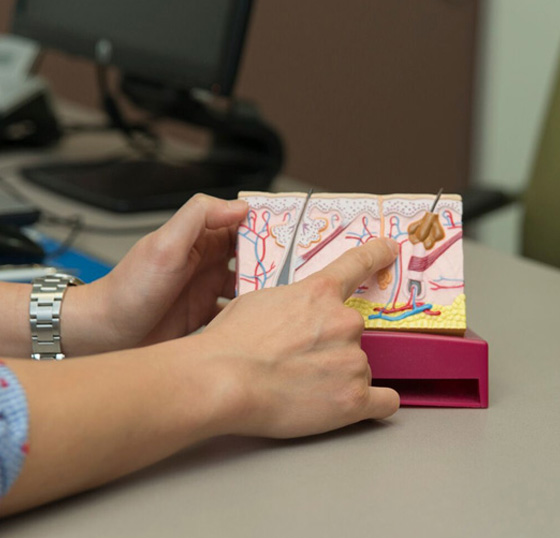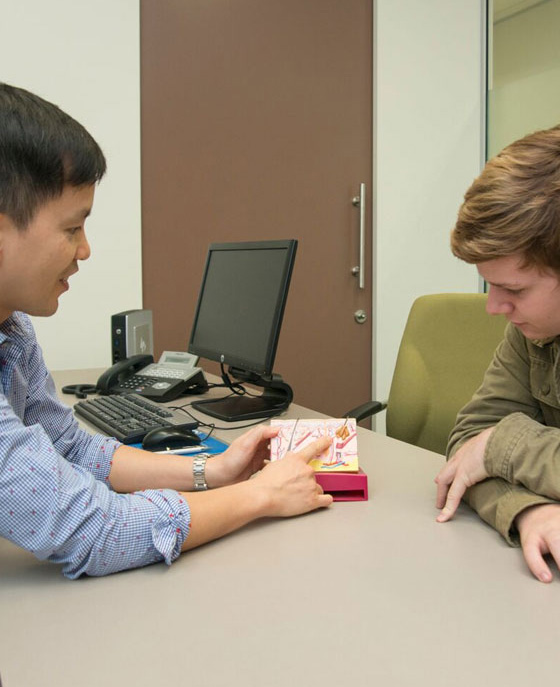Overview
Almost everyone has some acne during puberty and teenage years. However acne can persist in a significant proportion of individuals until their late thirties and even forties. Some people can develop more severe late-onset acne in adulthood despite minimal acne during their adolescence. Individuals with hormonal abnormalities or a family history of significant acne are more at risk of severe acne. There is also increasing evidence for the role of dietary and lifestyle factors in making acne worse.
Moderate to severe acne can have significant impact on self-esteem and leave unattractive long-lasting scars if timely and effective treatment is not instituted. The psychological and social effects of acne scars on an individual are often underestimated. It is important to recognize that acne can be effectively treated such that significant acne scars should only exist in the history books.
A number of factors are at play when lesions of acne are formed on the skin including sebum (oil) production, follicular occlusion (clogged pores) and bacteria causing inflammation. Acne treatment ideally should target all these causative factors and usually requires a combination of medications. Most over-the-counter acne products contain benzoyl peroxide. Common prescribed medications for acne include topical antibiotics or retinoids and oral antibiotics. Some female patients will also require hormonal treatment such as the contraceptive pill or anti-androgen medications. Patients with more severe acne may require oral isotretinoin which should only be prescribed by a dermatologist. Consultation with a dermatologist at our clinic is particularly recommended if your acne is more severe or is not responding to treatment.

Acne scars
Acne lesions leave marks on the skin mainly due to their associated inflammation. Manifestations of the damaging effects of this inflammation may include:
- Post-inflammatory erythema and hyperpigmentation: red or dark marks that can last for months
- Atrophic and box-car scars due to localized loss of the skin dermis
- Ice-pick scars: loss of skin dermis with fibrous tracts running deep into the skin
- Rolling scars: skin is tethered down due to large deep scars that usually arise after deeper acne nodules heal
- Keloid and hypertrophic scars: lumpy overgrowths of scar tissue common on the chest, back, shoulders and along the jaw

General skin care for acne
- Gentle cleansing twice daily
- Look for non-comedogenic products when using moisturizers or cosmetics
- Avoid sauna or steam facial treatments
- Avoid abrasive cleansing or scrubbing
- Avoid picking or squeezing acne spots
Acne treatment
Prompt and effective treatment is necessary for moderate to severe acne to prevent scars from developing. The ideal treatment must be tailored to your own circumstances and also depends on the type and severity of your acne. Detailed and tailored treatment can only be planned following a formal consultation. Your treatment may require one or usually a combination of the following
Topical treatments
- Retinoids: adapalene, isotretinoin, tazarotene, tretinoin
- Benzoyl peroxide
- Azelaic acid
- Antibiotics: clindamycin, dapsone
- Others: nicotinamide, salicylic acid, sulphur, chemical peels
Hormonal therapy
- Combined oral contraceptive pill
- Anti-androgens: cyproterone acetate, spironolactone
Oral medications
- Antibiotics: doxycycline, minocycline, erythromycin, clindamycin, trimethoprim
- Isotretinoin
- Others: zinc
Physical therapies
- Physical extraction of comedones
- Hyfrecation or light cautery
- Photodynamic therapy
Oral isotretinoin treatment for acne
This medication must only be used under the supervision of a dermatologist or a specialist physician experienced with its use. It must not be taken by pregnant women or by women planning to conceive as it is a teratogen that can cause serious damage to the foetus.
Oral isotretinoin is the treatment of choice for severe acne as it is extremely effective and can be life changing. It may also be used for individuals with acne of moderate severity but have failed other treatments
Oral isotretinoin has major therapeutic effects that target the causative factors in the formation of acne. It causes shrinkage of the sebaceous (oil) glands, unblocking of the pores and reduction of inflammation.
Oral isotretinoin has a number of uncommon or rare but potentially serious side effects
- Intracranial hypertension causing headaches, visual disturbances, nausea and vomiting
- Abnormal liver function
- Increased cholesterol and triglycerides
- Depression and suicide: large studies have failed to demonstrate oral isotretinoin as a cause of depression or suicide. However mood or psychiatric disorders are not uncommon in adolescents and they need to be recognized so that early intervention is instituted.
Hormonal acne
Acne is driven by androgens (male-type hormones) and is more severe in individuals with excess of androgens. Common causes of hormonal acne include
- Polycystic ovarian syndrome (PCOS): other features include irregular menstrual cycles, excess facial and body hair, overweight and reduced fertility
- Progestogen-only contraceptive methods: ‘mini pill’, ‘Depot injections’, implants and certain IUD (intrauterine devices)
- Anabolic steroids
- Late-onset congenital adrenal hyperplasia: can affect both females and males
Lifestyle factors affecting acne
The skin is certainly affected by lifestyle factors just like most other organs in the body. However, unsubstantiated ‘myths’ need to be recognized as they may compromise optimal treatment outcome for your acne. There is scientific evidence for the following lifestyle factors to make acne worse
- Diet: foods with high glycaemic index and milk or milk products
- Psychological stress
- Exposure to oils through work or use of oily creams and cosmetic products
- Heat/humidity and sweating
